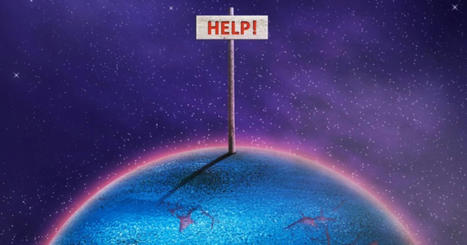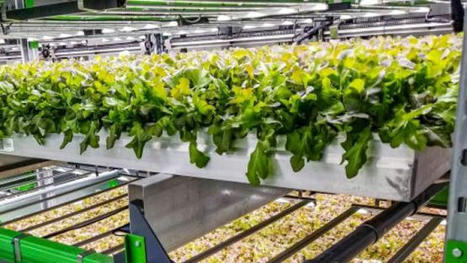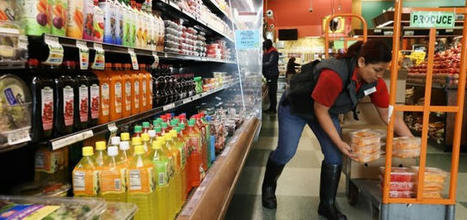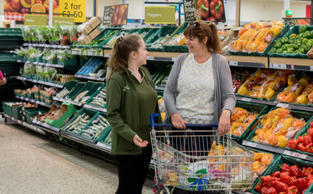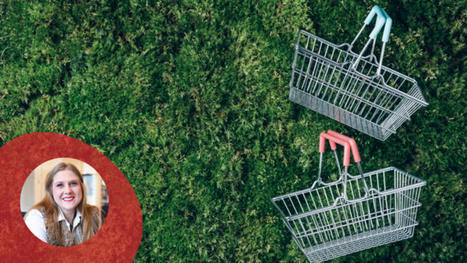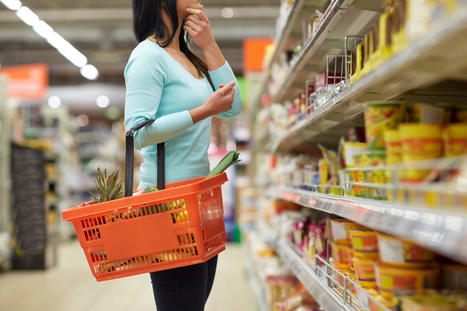 Your new post is loading...
 Your new post is loading...
Meeting Customer Demand While Cutting Carbon Emissions, Walmart is Fast Rolling out Drone Deliveries, says Senior SVP of Automation, Prathibha Rajashekhar Amazon is expanding its drone deliveries beyond the US for the first time, rolling out its Prime Air service in the UK and Italy by the end of 2024; while Walmart, which claims to have completed more than 20,000 drone-based deliveries since first taking to the skies two years ago, is taking its drone service to new heights.
Via EcoVadis
Sustainability has become a top priority for many consumers, and retailers are responding. A Deloitte report showed that 55% of consumers surveyed recently bought a sustainable product or service. In response to growing demand for eco-friendly products, retailers are trying to reduce their impact on the environment. They’re working to combat the effects of climate change, reduce waste, and eliminate their carbon footprint.
The sustainability trends for 2023 go beyond eco-friendliness, however. They also include measures aimed at improving working conditions and employee well-being.
In order to meet these sweeping goals, companies rely on data and technology.
Sustainability trends 2023 reshaping retail
The United Nations World Commission on Environment and Development defined sustainable development as “meeting the needs of the present without compromising the ability of future generations to meet their own needs.”
In other words, it’s a way to preserve resources, care about the environment, and build a better, safer reality for all.
Here’s our breakdown of some of the biggest sustainability trends impacting retail in 2023:
1. Greater transparency, increased regulation
2. Focus on improving delivery to reduce the carbon footprint
3. Rise of the circular economy
4. Eco-friendly, fair workplaces
5. Ethical supply chain
6. Growing role of data and AI in sustainability efforts
7. Reliance on cloud technology
Via EcoVadis
The voluntary guidelines, published by the BRC, outline the steps retailers can take to adhere to circular economy principles. By following this circular model, the BRC says retailers will further the progress they have already made to lengthen the lifecycle of the products they buy.
As part of the guidelines, it explains clothing, footwear, homeware textiles, and other items, retailers can promote resale markets and platforms; use hire and rental subscription services; and offer product swaps, upcycling and repair schemes, instead of throwing away items.
The guidelines also emphasise the importance of quality checks, which “clearly informs” the customer of the item’s condition. They also clarify that its aim is not to promote the circulation of perfect items, but rather to circulate all items, “safe in the knowledge” that both buyer and seller have the same level of information and expectation of their condition.
Retailers recognise the role they can play in helping their customers shop in more environmentally friendly ways.
The UK trade association explains that its long-term goal is to limit, and ultimately end, the sending of items to landfill unnecessarily and to keep them in circulation for longer so that they can be used and loved by more people.
The BRC says it is already working with retailers on their journey to Net Zero through their Climate Action Roadmap. Supported by over 80 major retailers, it is the Retail Industry’s commitment to reduce industry and supply chain carbon emissions to zero by 2040.
Chief Executive of the BRC, Helen Dickinson OBE, said: “We are delighted to launch our first voluntary Guideline on second-hand and preloved items. With more people looking for ways to shop sustainably, particularly as the cost of living rises, the sale of second-hand items in-store and online can encourage sustainable behaviours at affordable prices and take us one step further towards a circular economy.
“Retailers recognise the role they can play in helping their customers shop in more environmentally friendly ways, and we hope that this Guideline will help many on their sustainability journey.”
Via EcoVadis
Final negotiations have begun between the European Council, Parliament and Commission on a regulation that will ban products from the EU market that result from deforestation.
It will impact what is placed on supermarket shelves, and, importantly, retailers might be held accountable.
The proposal focuses on coffee, cacao, cattle, palm oil, soy and wood products. Among these commodities, the palm oil sector is at the forefront of sustainability, reaching 93% uptake of certified sustainable palm oil in Europe, even before legislation.
The core of the proposal requires that only products that are both legally produced and demonstrably free from deforestation should be allowed on the EU market.
To guarantee this, companies must submit a due diligence statement which states that the product is not only deforestation-free but also shows the exact plot of land where it originated.
This can be achieved by making the first importer (operator) responsible for this due diligence statement.
All subsequent actors who handle the product commercially (traders), such as retailers, would then ensure that the information they receive from the operator is correct.
Via EcoVadis
The country’s most sustainably minded retailers are placing more of an emphasis on sourcing — by both boosting locally and sustainably produced food and by requiring stricter environmental standards from their suppliers. This ranges from sourcing more sustainable seafood, including canned tuna, to ensuring that beef is being produced with no deforestation. Palm oil, coffee, eggs, soy and pulp are other commodities that are being more closely watched by grocers to ensure sustainable production.
In fact, the 2022 Sustainability Barometer released by London-based Mintel finds that from a global consumer perspective, concerns about water and food shortages are now being prioritized ahead of previous preoccupations with waste and plastic. Therefore, it makes sense for grocers to include messaging about their efforts in more sustainable sourcing and in combating climate change.
Several retailers, including Batavia, Ill.-based Aldi US, are committing that all of the fresh, frozen and farmed seafood they purchase will be third-party certified as sustainable or from fishery improvement projects by the end of 2025. Meanwhile, expect to see more of these grocers ramp up tracing efforts so that customers will also recognize their efforts in sustainability.
Via EcoVadis
With consumers prioritizing environmental sustainability, Amazon and Target unveiled stores that aim to use less energy than they produce, the retailers announced last week. Target's first net-zero energy store is located in Vista, California, and the new Amazon Fresh store, which is pursuing net-zero carbon certification, is located in Seattle. The new Amazon Fresh Seattle location features a CO2-based refrigeration system, has steel byproducts to reduce embodied carbon and fully sources its electricity from the company's renewable energy projects. Target's store has solar carports, CO2 refrigeration and LED lighting. Drawing from its experience, Target said it plans to add CO2 refrigeration to all of its stores by 2040. Amazon said that some of the upgrades will be used at all of its Amazon Fresh grocery stores going forward, such as the lower-carbon concrete flooring.
Via EcoVadis
Russian retailer Fix Price has announced the rollout of eco-friendly branded bags across its estate, which are made form 40% recycled polyethylene.
Over the coming months, all large shopping bags, of which between four million and eight million are sold per month, will be replaced with new eco-friendlier alternatives.
The bags contain no bio-additives or PVC and can be recycled.
Via EcoVadis
New climate goal will require retailer to slash emissions generated in the production and end use of its products, from agriculture to food waste
The UK's largest supermarket chain has committed to delivering net zero emissions across its entire value chain by 2050, vowing to target the emissions generated from the sourcing of raw materials, agriculture,...
Via EcoVadis
|
Owing to its vast Scope 3 footprint, the retail industry at large accounts for over 25% of global emissions and 40% of the global plastic usage. Wary of the situation, and faced with consumer and legislation-induced pressure, the retail industry is starting to act.
An Oxford Economics study showed that 52% of the organizations had commenced sourcing sustainable materials for product manufacturing or merchandising, and 62% claim to have sustainability plans in place. And yet, just under 20% of the retailers are on course to curb their emissions and prevent the rise in global temperatures (of no more than a 1.5⁰C).
Via EcoVadis
German wholesale giant Metro aims to reduce water consumption across its operations by 10% per square metre of net operating space by 2030 compared to the base year 2021.
The move will contribute to the global community's Sustainable Development Goal (SDG) 12, which seeks to produce and consume sustainably and reduce the company's operating costs.
The new target replaces the previous goal of a 5% reduction in water consumption by 2025 compared to fiscal year 2016/17, the wholesaler noted.
The company exceeded this target by cutting water consumption by 19% in the current fiscal year.
Ivonne Bollow, SVP of public policy and corporate responsibility at Metro AG, said, "Water scarcity is one of the biggest global challenges today. Global water demand is continuously increasing, while available water resources are steadily declining due to climate change – with drastic consequences for the world's food supply and nutrition. [...]
"As a globally active food wholesaler, water and climate protection are therefore a high priority for Metro and we have set ourselves ambitious goals that we will consistently pursue and, if necessary, formulate even more ambitiously."
Via EcoVadis
We are in the midst of a real-time, seismic shift as consumers transform expectations of global supply and demand models. The pandemic exposed the fragility of many supply chain networks. An inability to sense and dynamically adjust to shifting demand signals, consumer preferences, labour requirements, transportation, storage, inventory and trade policy changes caused havoc to economies and brands around the world.
According to McKinsey, “Investments in technology and automation in distribution centres are now at the forefront of most Chief Supply Chain Officers’ agendas.” Gartner recently upped its supply chain management technology forecast from 8% to 14% in compounded annual growth rate – forecasting a $28 billion investment by 2025.
Retailers are racing to transform store, digital, fulfilment and service experiences in an effort to win over omnichannel consumers, boost employee productivity and increase profitability, all the while trying to balance increasing environmental requirements.
Digital transformation initiatives have kicked into high gear across supply chains, too, allowing brands to reap the benefits of cloud, composable IT architecture, microservices and AI in efforts to better match supply with demand.
Via EcoVadis
There are signs of a disconnect between consumers and retailers when it comes to sustainability.
A recent report has found that two-thirds of consumers are willing to pay more for sustainable products than retailers expect — and reveals that consumer preference for recommerce models is also being underserved.
Further reinforcing this misalignment is the finding that only half of the senior retailer executives surveyed believe sustainability to be an important purchase consideration for consumers — a stark contrast to the three-quarters of consumers saying it is “somewhat” or “very important” to them.
Where the two sides do meet is with nearly all the senior retail executives agreeing that today’s consumer expects retailers to operate in a more sustainable way.
Via EcoVadis
Sustainability often comes at a price, but despite inflation and other global disruptions, many Americans are open to shopping sustainability. Among those surveyed, 68% indicated they would pay more for sustainable products. This increased from 56% in 2020 to 47% in 2019. Gen Z stood out again when it came to spending and reported that they were the most likely to pay up to 100% more for a sustainable product.
Related to cost is also where consumers are shopping. Sustainability is driving consumers to change the brands they shop from based on whether they make sustainable offerings. 50% of U.S. consumers have changed where they purchased goods in the past year, and 14% are purchasing from businesses with sustainable practices.
Via EcoVadis
Brands have realized that focusing on sustainability is a critical part of the modern supply chain by locating and arranging warehouses and fulfillment centers at the nearest location to optimize travel time and resources. There is a huge shift that has been observed in the brand's world as the industry is switching to a non-retailer-based model and incorporating D2C models in their businesses. And the same trend is forecast to grow over 15 times, almost threefold from the current size by reaching $100 billion, as per the recent report by Statista. D2C is becoming a pivotal factor and disrupting the retail industry post-pandemic. The innovative approach, quality product, unbelievable level of customization is catching the attention of especially young customers towards D2C brands.
Via EcoVadis
Consumers are willing to spend more for sustainable brands, but that a significant gap exists between retailers and customers as to what consumers want and what’s actually being delivered, according to new data released by First Insight and the Baker Retailing Center at the Wharton School of the University of Pennsylvania.
“This report clearly demonstrates that retailers are leaving money on the table. Brands and retailers must listen to the voice of the customer on issues as critical as sustainability. Consumers want more than performative measures from retailers and brands when it comes to ESG priorities, which will only become more important as Gen Z grows in influence,” says Greg Petro, CEO of First Insight.
Via EcoVadis
|



 Your new post is loading...
Your new post is loading...



